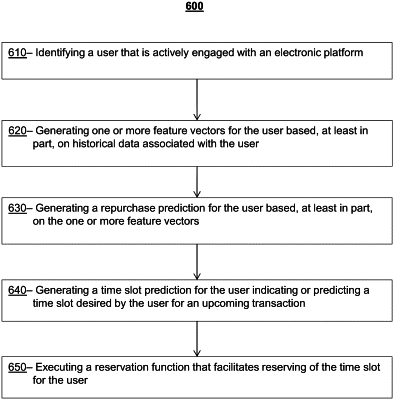| CPC G06Q 10/02 (2013.01) [G06N 20/00 (2019.01); G06Q 10/04 (2013.01); G06Q 10/0836 (2013.01); G06Q 10/1093 (2013.01)] | 20 Claims |

|
1. A system comprising:
one or more processors; and
one or more non-transitory computer-readable storage devices storing computing instructions, that when executed on the one or more processors, cause the one or more processors to perform operations comprising:
generating one or more feature vectors for a user, the one or more feature vectors at least comprising transaction-based features and slot-based features;
generating, using a first machine learning model of a machine learning architecture, a first output comprising a repurchase prediction for the user based, at least in part, on the one or more feature vectors to learn transaction patterns of the user;
generating, using a second machine learning model of the machine learning architecture and using respective data of the repurchase prediction for the user, a second output comprising a time slot prediction for the user based, at least in part, on the one or more feature vectors, wherein the time slot prediction predicts a time slot desired by the user for an upcoming transaction, wherein the first machine learning model is performed independently from the second machine learning model, wherein the machine learning architecture comprises the first machine learning model and the second machine learning model, and wherein the machine learning architecture further comprises one or more artificial neural networks configured to execute the first machine learning model or the second machine learning model based on the transaction patterns of the user;
initiating one or more reservation functions based at least in part on a combination of the first output and the second output to transmit an option to the user that enables the user to access a graphical user interface (GUI) to reserve a reservation function of the one or more reservation functions;
integrating the reservation function with a digital shopping cart system to create the upcoming transaction based on the repurchase prediction and the time slot prediction previously generated by the machine learning architecture; and
executing the reservation function that facilitates reserving of the time slot for the upcoming transaction for the user.
|